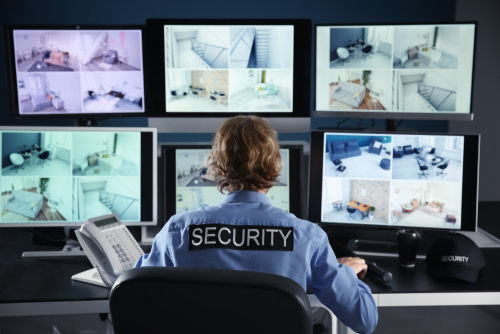Though recently published data indicates some physical crime rates such as burglary and aggravated assault may be declining across the U.S., other incidents including motor vehicle theft have been seen to increase by over 33%. In addition, violent crime rates remain elevated when compared to figures seen in recent years, placing unwanted stress on property security teams.

Thankfully, with the advent of smart technology, modern physical security professionals are able to improve the efficiency of existing crime detection processes with support from real-time data and automated responses, enabling teams to enact preventative measures to deter criminality.
With intelligent integrated security systems in operation, staff become well-positioned to not only address unfolding incidents faster and with improved accuracy, but also deter unauthorized persons from posing a threat to both people and property. For security staff looking to improve incident responses, here are 4 ways to secure your facility using smart technology.
1. AI-Informed Video Security Cameras
Research indicates that the mere presence of visible commercial security cameras may reduce the frequency of physical crimes by as much as 13%. However, traditional CCTV cameras often lack the required utility to enable teams to appropriately respond to unfolding incidents.
To reasonably operate a traditional video security system, on-site teams must manually assess live footage to investigate suspicious activity, meaning at least one team member will be tied to a physical monitoring location. AI-informed systems can be deployed to remove this necessity by providing staff with automated real-time alerts and remote-access viewing capabilities.
AI video analytics software can be programmed to autonomously detect specific stimuli such as contraband items, motion in restricted areas, or unauthorized vehicles, with real-time alerts sent directly to staff members’ smart devices if linked to a cloud-based security management system. This leaves security guards free to patrol the property as required, with reassurance that any suspicious activity will be automatically detected, and alerts will be sent instantly to help inform responses.
2. Expanded Access Control Systems
Managed access control networks remain a crucial component of all reliable property security systems, acting to prevent unauthorized persons from entering secure locations to reduce the occurrence of physical crimes. Even basic access systems used only to secure select locations will help prevent intruders from causing harm, but expanded systems can be more effective.
All facilities with road access and private parking lots should consider the installation of exterior gate access control readers to prevent unauthorized vehicles from entering the premises. Gate access readers can be connected to internal systems, allowing staff to use a single credential to manage full-site access, alongside integrations with security cameras to further deter intrusions.
License plate recognition cameras can be connected to gate access readers to manage entry in relation to registration numbers. Plates associated with staff and company-owned cars will be stored in a database and used to verify credentials. If an unverified vehicle is detected, gates will remain secured and live alerts will be sent to security teams for further investigation.
3. Internet of Things (IoT) Integrations
IoT devices can be used to dramatically improve the efficacy of existing physical security tools by enabling teams to develop automated incident responses triggered by a variety of stimuli. IoT devices, including sensors and actuators, are designed to communicate with installed hardware via a secure internet connection, allowing teams to create fully customized incident responses.
For example, IoT motion sensors can be connected to access control door locks and installed alarms, with both of these devices instructed to automatically engage if motion is detected within certain parameters. Additionally, IoT sound detectors may be connected to smart door locks and programmed to instantly secure all access points if sounds consistent with a break-in are heard.
When deployed as part of a wider cloud-based security management system, active IoT devices will provide teams with a holistic view of the facility’s defenses at all times. Real-time alerts will help staff to remain focused on unfolding events and suspicious activity, with teams able to view live data feeds remotely at any time by simply accessing the platform via a secure smart device.
4. Panic Button Installations
Though the presence of video security cameras, access control systems, and IoT-enabled tools will help to deter the occurrence of physical crimes, plans must be in place to respond to any threats that manage to bypass these systems. Panic button installations can act to achieve this.
Discreet panic buttons can be installed in key locations like offices, classrooms, reception desks, or service counters, which when pressed, will send a silent alert to security teams and/or local authorities requesting an immediate security response and activating installed security systems.
Panic buttons can be integrated alongside access control locks and security cameras, enabling staff to develop customized responses to common threats, with wireless panic button systems also available offering patrolling security guards a way to request backup quickly and discreetly.
Conclusion
When it comes to property security, prevention is better than reaction, meaning teams must look to develop intelligent security systems designed to visibly deter criminality and improve incident responses. By utilizing smart video security cameras, expanded access control systems, and IoT devices to strengthen existing security protocols, teams are better equipped to both deter instances of physical crime and respond to threats more efficiently to secure their facilities.
Howie Robleza is a freelance writer interested in tech, legal, and property trends. When she’s not writing, she works in commercial property management.
